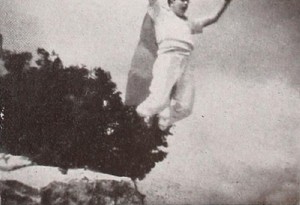"Part one of Navajo Weaving. Un-staged documentary footage shot and edited by Sallie Wagner. Sallie's description of the film: 'Crip Chee's Hogan, Milton Davis holding lamb, Eleanor Johnson from Hawaii, Bill Lippincott, Grandstaff (center), Hosteen Glish - purchase of rams for up-breeding, shearing at Wide Ruins, Jim House on horseback, Joe Toddy taking wool out for sorting and sacking for shipment, dipping in chute, Walter Ashley putting sheep in dip, Little Shorty to left, washing the wool before spinning, Patsy Martin sorting, Sybil Shorty carding wool, Dorothy Lippincott Stockton trying to learn, Louise Dale spinning wool, washing of yarn, gathering plants for dyes, Little Woman (Captive of Kit Carson - survived the Long March) grey-haired woman - stripping bark from Juniper root for red dye'." New Mexico States Archives.
"Part two of Navajo Weaving. Un-staged documentary footage shot and edited by Sallie Wagner. Sallie's description of the film: 'Rose Martin, Patsy Martin warping, Sybil Shorty weaving, looms built by the Lippincotts at the Wide Ruins Indian School, Madge Clark, Dan Gaddy, and John Joe in front of the trading post, Bill Lippincott in patio with rug display, Bill Cousins selling rug to tourist'." New Mexico State Archives.

"Donald H. Kelly has cast a comic strip character in Superman Goes West, integrating travel sequences and comedy with great success. While the magnificent cinematographic record of a Western trip is the most engaging factor of the film, the entertainment value of the Superman motif cannot be minimized. The fictional hero is shown to be the consuming interest of a small boy passenger on the trip. The lad proceeds to read Superman comics under varying conditions, despite a changing background of allegedly awe inspiring scenery. One dream sequence with a Superman flavor is a triumph of trick cinematography." Movie Makers, Dec. 1943, 478.
"Un-staged documentary footage shot and edited by Sallie Wagner. Sallie's description of the film: 'Trading post at Wide Ruins, "Trader Burnt Hat" - Bill Lippincott, Sallie, Antoinette Badgley - mother, baby, Sallie, group of three left to right - Gaddy, John Joe, and ? , Tom Big Gun - raising his arm quickly Hosteen Belahi. Little Woman - captive of [Kit] Carson [survived the Long Walk and Navajo incarceration at Ft. Sumner], John Joe's wife (gold skirt) and daughter, Mary Toddy and John Toddy, young children, Joe Toddy, Nashoshi Begay, Paul Jones in trading post trading with Bill Cousins, wife and child of Tom Big Gun, Lukachuka - also captive of Carson (Blackrock's brother - both medicine men). Navajo Refugee Site "Kinazin" (which means Standing House) near Wide Ruins, Pat Norton inside "Kinazin" ruins, Cliff Ruin in Canyon del Muerto, ceremonial jar washed out by rain, Bill Lippincott - Elvin Jonas and Jack Norton excavating the pot, climbing cliff at Canyon de Chelly - Larry Bell and Doyle Mulligan, Sallie and Bill looking at pictographs below Wide Ruins, pictographs near spring north of trading post, Navajo Fence at Wide Ruins, numerous sunsets'." New Mexico State Archives.
"The Wonder Trail, 1000 ft., 35mm., filmed by Ralph C. Wildes, has also met with the approval of professional critics, for it has been released as a professional short subject and has received general praise. One reviewer wrote, "The Wonder Trail is an unforgettable picture; the restful, sheer beauty of it is an experience in entertainment." This is high praise, indeed, for an amateur picture since it must be remembered that the reviewer was comparing it with the hundreds — even thousands — of professional short subjects released each year. It is a scenic built from sequences of the Grand Canyon, Yosemite and the Redwood forests of California. Its photography is superlatively good and rare artistic judgment was exercised in the selection of camera viewpoints to effect beautiful compositions and to emphasize the dramatic value of mountains, falls and trees. The quality of the film's continuity lies in the leisurely sequences which display skill and care in both planning and editing." Movie Makers, Dec. 1931, 658
Total Pages: 2